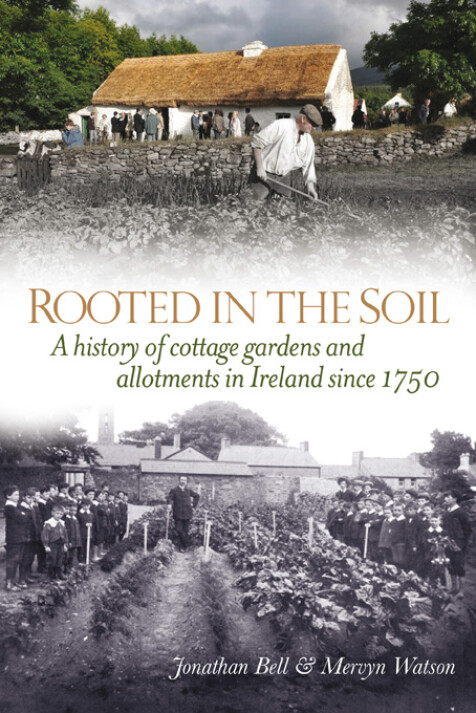Rooted in the soil
A history of cottage gardens and allotments in Ireland since 1750
Jonathan Bell & Mervyn Watson
‘Lavishly illustrated … The skills developed by these two retired curators of Ulster Folk and Transport Museum oozes from every page … Altogether this is an interesting travelogue though a relatively unknown aspect of Irish agricultural history', Michael Turner, Agricultural History Review (January 2014).
‘An attractive history of horticulture which weaves the subject into the larger social trends of the modern era … Rooted in the Soil delivers a thorough but readable history with fine illustrations of the role of cottage gardens, allotments, school gardens and horticultural instruction in the life of Ireland’s town and rural dwellers from 1750 to modern times. It is just the kind of book to keep a gardener in touch with the subject over the winter months until the green shoots of spring signal a start to a new outdoor season', Kildare Library review (July 2013).
‘This book is much welcomed … The book has many strengths. It is based on extensive primary source research, making much use of pamphlets, newspapers, journal articles and official reports. It shows a nuanced awareness of the wide range of arguments for allotments and gardens and presents these in a balanced way … Bell and Watson are at their best in exploring some fascinating initiatives in more depth … The book provides rich information about cultivation methods and crops … contains attractive photographs of contemporary allotments and their holders … Another particularly interesting section of the book relates to the origins of allotments in Ireland … this is a most interesting and enjoyable book, which should be on the shelves of anyone with a serious interest in the history of Irish allotments or gardens … it is to be hoped that it will stimulate much further research into this fascinating and neglected aspect of Irish history', Jeremy Burchardt, Irish Economic and Social History (2013).
‘My inner (and, it has to be said, armchair) gardener dreamed of self-sufficiency while reading Rooted in the Soil', Aoife O'Connor, Irish Times (December 2012).
‘The authors show how it is still the public good what benefits from these small productive plots … Above all, the book shows how allotments engender good health, good food, satisfaction to their owners, and a convivial social atmosphere out in the plots', John Akeroyd, Sherkin Comment (2012).

